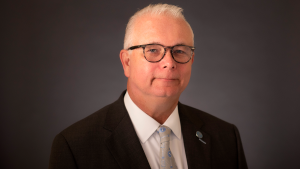Chairman Boliek’s Remarks

Boliek is an attorney and partner with Williford, Crenshaw, Boliek and Frangakis LLP in Fayetteville. His practice focuses on litigation and consults on healthcare issues, specifically those in the allied health field. Previously, he spent several years as an award-winning journalist, political consultant and public relations professional. Boliek also previously served as CEO of a government contracting firm and as a prosecutor in Cumberland County.
Americans are losing faith in our institutions of higher education. Poll data indicates that over the past several years there is a growing gap between those who agree that higher education has a positive effect on our country and those who believe higher education has a negative effect on our country. At Carolina, we believe higher education is essential to moving our country forward.
We cannot dismiss concerns about eroding confidence in higher education. Our nation’s public universities rely on over $100 billion per year in state appropriated dollars, to say nothing of more than $225 billion in federal student loans and grants flowing into the higher education sector every year. Large swaths of taxpayers who are footing this bill believe that instead of easing the political resentments of American society, our nation’s universities often stoke them. Rather than offering students the chance to hone their skills of reasoned deliberation, many campuses are training grounds for the new American pastime of cancelling those we disagree with. A decade’s worth of data demonstrates that students habitually self-censor at leading colleges and universities.
As trustees of America’s oldest public university, we take these problems seriously, and we have chosen action over excuses. When the University of North Carolina was founded in 1789, the state’s legislature met to discharge the “indispensable duty of every Legislature” to fit the rising generation “for an honorable discharge of the social duties of life” through “the strictest attention to their education.” We believe public universities today still have this distinctive mission to prepare young people for the responsibilities of citizenship, in addition to the demands of the workforce. And we believe trustees of public universities have a special obligation to serve the public good.
In August, we endorsed the “Kalven Report,” a seminal statement on the need for the university proper to remain neutral on political issues. We also re-emphasized our support for the Chicago Statement on freedom of expression, following the admirable lead of our Faculty Council.
Yesterday, this body discussed a commitment to civil discourse amongst ourselves. Appointed trustees worked with our Student Body President (who aptly serves her role as a trustee in addition to her work as the Student Body President) on a framework for civil discourse among trustees. We’ve developed and are in the process of finalizing a voluntary commitment asking each of us to act with civility and with decorum (although the exact language is still in works). This is leading by example.
We heard briefly yesterday from our Provost about a proposed School of Civic Life and Leadership (SCiLL). The School’s core mission would be to develop both the capacities and knowledge necessary for healthy democratic citizenship. SCiLL’s curriculum will be anchored in the study of core texts, with particular attention to the foundations of the American experiment. The School will create space for a free-speech culture of civil and open inquiry in which we recognize members of political outgroups as friends to learn from rather than foes to vanquish. The University would recruit additional faculty to bring fresh perspectives and approaches. We are not subtracting voices – but we will be adding them. The curriculum will invite students to develop democratic competencies and key virtues such as intellectual humility, curiosity, charity, and self-criticism as they seek the truth about the fundamental questions of social and political life, economics, ethics, religion, and aesthetics. Students will develop capacities for deliberation and debate as they bring into critical conversation different viewpoints.
Now is the time to keep up the momentum. The Board of Trustees has led in this arena before. It was a simple resolution from the Board of Trustees that sparked the Program for Public Discourse. And that has been an energizing program. The Program for Public Discourse has been an engine for free speech and has served as a national example.
I propose that this Board support today, by way of a resolution, the development of the school of Civic Life and Leadership. This will place the University of North Carolina at Chapel Hill as a national leader on this important topic.
